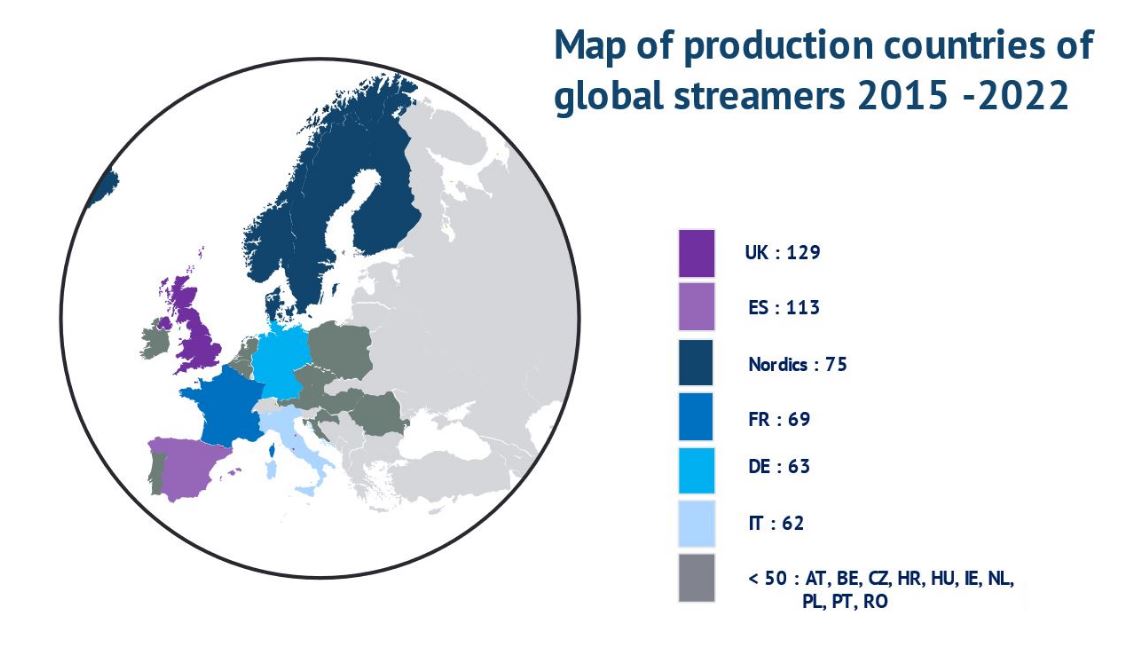Download “Audiovisual fiction production in Europe – 2022 figures” here
(New version of the report updated on 14 November 2023)
A new edition of the report “Audiovisual fiction production in Europe – 2022 figures” has just been published by the European Audiovisual Observatory, part of the Council of Europe in Strasbourg. The report analyses the volume of TV/SVOD fiction films and series produced in Europe, and of European origin according to main acting roles, the main commissioners and producers, and the crews of screenwriters and directors involved in their creation.
This new report finds that:
- In 2022, most TV fiction commissioned by global streamers was produced in the UK and Spain.
- The production and release of original TV fiction resumed growth in 2022 after a halt during the COVID-19 crisis.
- Well over half of fiction titles produced in Europe in 2022 were commissioned by public service broadcasters (56%), followed by private broadcasters (35%) and global streamers (9%).
Most TV fiction by global streamers produced in the UK and Spain
Production countries of fiction titles commissioned by global streamers
Map of Europe and flag icon © Copyright Showeet.com
Source: European Audiovisual Observatory analysis of data by The European Metadata Group
In 2022, most TV fiction commissioned by global streamers was produced in Spain and the United Kingdom (39 titles each), both homes to Netflix production hubs in Madrid and British Shepperton Studios. Other significant production hubs for streamers were the Nordic countries and France (2015-2022).
With a big boost in investment, global streamers released 228 original European fiction titles in 2022 (all formats), versus 127 in 2021. This represents a massive hike of 80% YoY. Two thirds of these were commissioned by Netflix (50%) and Amazon (17%).
TV fiction production resumed growth in 2022
After a halt during the COVID-19 crisis, the production and release of original TV fiction resumed growth in 2022. However, the recovery of the market was not evenly spread. The 12% growth in the number of fiction titles produced in 2022 was not matched by volume of hours and number of episodes whose development stagnated when compared to 2021. On average, over 1 200 titles, 23 000 episodes and 14 000 hours (provisional figures. Title refers either to TV film title or a TV series season. Animation is not included) are produced in Europe each year (countries covered: EU27, the United Kingdom, Norwaym Switzerland and Iceland).
In recent years there has been growing interest in the production of shorter formats: High-end series (3 to 13 episodes) represented more than half of the titles produced in 2022 – a 105% growth since 2015. However, this remarkable development which continued throughout the COVID-19 crisis, did not equally translate into a notable growth of volume of hours as seasons had fewer and shorter episodes (probably as a way to cope with the increase in production costs and inflation). The episode duration of most TV series produced in Europe is longer than 16’ minutes, typically lasting 36’ to 65’ minutes.
Public service broadcasters commission 56% of titles and 39% of hours
Well over half of fiction titles produced in Europe in 2022 were commissioned by public service broadcasters (56%), followed by private broadcasters (35%) and global streamers (9%). However, since private broadcasters tend to dedicate a bigger share of their commissioning to daily soaps and telenovelas, they produced a higher volume of hours (58%) than public service broadcasters (39%). Global streamers accounted for 3% of hours as they do not invest in long running TV series.
About 15 000 screenwriters and 7 000 directors were involved in the production of European original fiction between 2015 and 2022.








